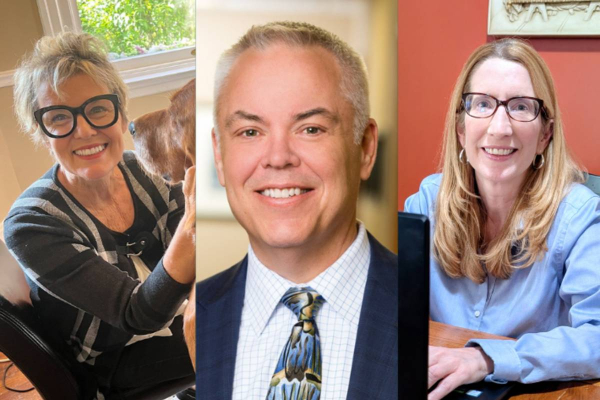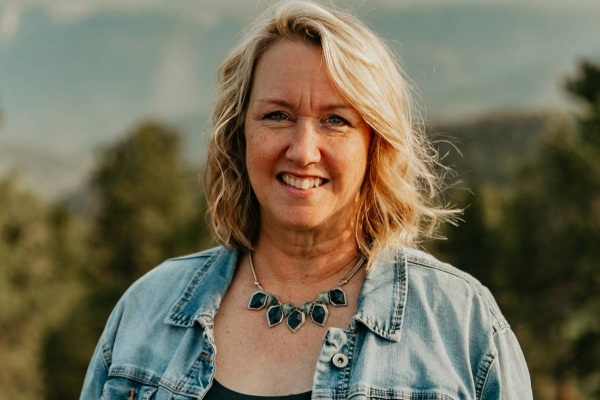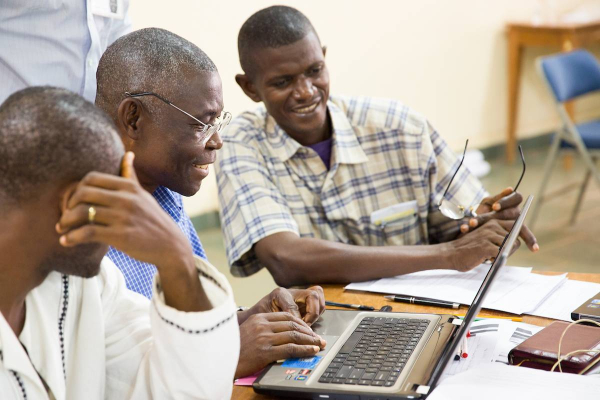8 Ways to Live Out Your Call to Reach the Nations

How do we actually live out God’s call to reach the nations, no matter where we live or work?
The Perspectives on the World Christian Movement course, which shares about God’s heart for the nations and our role in God’s great purpose, features four disciplines and four practices every Christian should strive to incorporate into his or her life in order to help spread the gospel.
Read how Wycliffe missionaries and Perspectives instructors engage with these disciplines and practices in their own lives.
THE DISCIPLINES
In order to more effectively respond to God’s mandate to reach the nations, every Christian should strive to incorporate four disciplines into their rhythms of life: prayer, learning, simplicity and community.
The Discipline of Prayer
Stacy Lee, a Perspectives coordinator and the Perspectives team lead for Wycliffe, is passionate about making prayer a priority.

“Bible translation in and of itself is a work of God,” Stacy said. “So prayer is vital! [Bible translation] just cannot be done without our full reliance on God. … And prayer is a recognition that we cannot do this in our own strength. … If I do any of the other stuff without prayer, it is just worthless.”
Stacy strives to make prayer an integral part of the daily rhythms of her life: “Prayer is a part of what we do and who we are at Wycliffe.”
“As I coordinate Perspectives, my main goal is to awaken students to God’s global mission and to equip them to pray,” she explained. “It’s a privilege to pray! Prayer is a part of every aspect of the work [of Bible translation]. … Whatever part of your journey, it should all be encompassed in prayer.”
The Discipline of Learning
David and Carleen Heath, who are Perspective instructors and translation advisers, constantly learn about the nations and grow in their understanding. This draws them closer to God and helps them grow in humility and understanding.

When David and Carleen were learning a local language in Africa, they liked to sit with their friends around a fire and practice talking about different topics. One day David started asking questions about their friends’ camel. “Is your camel stubborn?” he asked. “How much water does it drink? What types of things do you carry on their camel?”
To his dismay, Carleen quickly leaned over and whispered, “You’re not saying the word, ‘camel;’ you’re saying the word ‘potato!’” Everyone burst out laughing, and David never forgot that word again!
“We learned to laugh at ourselves,” David said. “We humbled ourselves before the people in the village and really put ourselves in the position of the learner so they wouldn’t feel intimidated by correcting us. We always considered them the experts. … That was elevating to them.”
David continued: “I think the American church can learn from our African brothers and sisters in Christ as much as they can learn from us.”
The Discipline of Simplicity

Marcia Woodward is a Perspectives instructor and launch coordinator who deeply values the discipline of simplicity. “The goal is for the Word of God to go to every people group, every nation [and] to the ends of the earth. … If we live simply, then we are able to go or send or mobilize or welcome … and accomplish that end.”
Marcia has striven to practice simplicity and give generously whenever and however God has asked, even in challenging situations. And God always provides abundantly. “He brought me pairs of shoes, airline tickets, tuition — it was just amazing!” she exclaimed.
She reflected: “Living simply really isn’t hard when you do it by the grace of God. I didn't just survive; I thrived! … There is a tremendous freedom and joy to be able to give generously.”
The Discipline of Community
Ministering to the nations is never an independent venture. Vernacular media specialist and Perspectives instructor Stephen Coats values community in all areas of his life — from family and friends to church to his Wycliffe team.

“I’ve never been involved in a media project where it’s something I [do on my own]. It doesn’t work that way. There’s always collaboration and co-laboring,” Stephen said. “Each contributor on the project makes it better than my original concept. In the end it might be different from what I originally envisioned, but it is something quite a bit better.”
Stephen also appreciates the Wycliffe community in times of challenge and hardship. “During one hard time, leadership brought us together and said, ‘We hear you. We know you’re hurting. We’re with you. We stand behind you.’ That was pivotal for me in my journey of community with Wycliffe, to know that in a time of pain and hurt, our leadership would support us.”
THE PRACTICES
God calls all Christians to participate in four crucial practices to reach the nations: mobilizing, sending, going and welcoming. Throughout different seasons of life, you may find God asking you to focus on one over the others, but all are valuable.
Mike Moline, a Perspectives instructor and Wycliffe mobilizer, is passionate about encouraging the American church to engage with the global Bible translation movement. “Mobilizing is important because people actually have to go and do these large, unfinished tasks. If we don’t go, we’ll miss the opportunity to be a part of [the Great Commission].”

God can and does use all skills and gifts to glorify Christ among the nations. Mike uses his love of public speaking and sharing information to make a difference: “Every opportunity I get, I share the strategic impact of Bible translation, which is what drew me into Wycliffe [in the first place].” As a result, Mike has seen multiple people get engaged in missions and Bible translation.
“One of our core reasons for Wycliffe existing as an organization is … to enable people to get involved in the Bible translation movement,” Mike explained. “Mobilization is part of helping the church fulfill its vision and responsibility: glorifying Christ among the nations.”
The Practice of Sending
Sending people to serve in missions is at the core of Jamie Farr’s role as both the vice president for Wycliffe’s planning, staffing and development department and also as a Perspectives instructor. “Sending is … [telling] the story of what we’ve seen God do globally,” Jamie said. “God gives that story power, and people respond … and want to participate in what he is doing.”

Jamie sees sending as inviting someone to do missions in community rather than trying to push someone toward an action. He said: “I believe the Lord has created us to belong and be a part of God's Kingdom. … The reasons why people ultimately go are because … the Lord is leading them and because someone said, ‘Come, be a part of my team.’”
“Sending doesn’t happen on one day and it's done,” he continued. “It's the deep care for people that really matters. … We steward the person.”
Jamie recalled a time when he prayed and walked alongside a couple he met in a Perspectives class as they sorted through their concerns. “If we address the needs of individuals … we can help people feel invited,” Jamie said. “It changes everything. … It [creates] a deeper sense of community and belonging.”
The Practice of Going
David Edwards, a Perspectives instructor and translation adviser, took Perspectives before he joined Wycliffe. During the course, he discovered there are many unreached people groups who don’t live in urban environments around the world.
“Somebody has got to go to them,” he observed, “and overcome the geographic distance [and] linguistic difference to catalyze something so that someday there will be indigenous witnesses for Christ.”
David recalled a time that a colleague was enquiring about a particular language group: “He asked us, ‘If someone wanted to learn about Jesus in that language group, how many days would he have to walk to find a believer?’”
David realized that a person in that language group could have to walk more than 30 days to find a believer! “That’s why going is important,” David exclaimed. “Should that person have to walk those 30 days? Or should we go closer and reduce the distance?”
Going that distance takes commitment. “Learning languages and cultures … and doing Bible translation take a long time,” he said. “Relationships and trust and influence take a long-term commitment.”
The Practice of Welcoming
Trevor Deck is a Wycliffe Perspectives instructor who also serves on the Global Diaspora Team for SIL International, our close strategic partner.

Trevor helps build relationships between dispersed communities (also called “diaspora”) and Bible translation projects around the world. For example, one translation project in Africa was struggling to find enough language community members to check the translation since their sensitive context prevented them asking for help from people publicly. Trevor found believers living in the U.S. who spoke that language and were interested in reviewing the translation draft.
“When I sent the comments and reactions from the language speakers to the consultant team,” Trevor said, “they said it was the best feedback on the project yet!”
Because language speakers are no longer always in one geographic location, engaging diaspora is more crucial than ever. “The diaspora segment is a vital part of the language community,” Trevor observed. “They have to be included and involved in the Bible translation process. If we ignore them, they won’t feel that the Scripture is theirs when it is published.”
Want to learn more about the Perspectives on the World Christian Movement course? Visit perspectives.org to find a local or virtual class!






